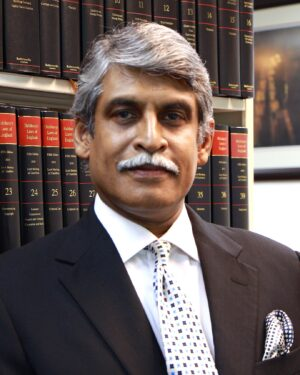Focus Malaysia:
GK Ganesan gives his take if the Agong’s power to grant Najib a pardon ‘personal’ and ‘absolute’

For the uninitiated, the then Yang di-Pertuan Agong (YDPA) alongside the Federal Territories’ Pardons Board, had decreed that Najb’s jail sentence and fines be reduced by half and 76% (to six years from 12 years and RM210 mil to RM50 mil) respectively.
The disgraced politician is set to be freed by August 2028 if he settles the fine imposed.
Some have reacted incredulously at this piece of good fortune meted out to a prominent politician who has been found guilty of one of the biggest financial scandals in history.
The question is whether the Sultan of Pahang in one of his last acts as the nation’s monarch had followed the spirit and letter of the law when exercising his powers of pardon.
Constitutional law expert GK Ganesan has outlined the many pertinent issues surrounding this controversial pardon that has divided opinion on his website PARADOX.

GK Ganesan
He begins by clearly stating what he thought was fundamental arising from the power granted to the Agong under Article 42(1) of the Federal Constitution.

Below is a summary of the legal eagle’s explanation for his stance. To the question if the Agong’s power is “absolute”, he argues that the ruler’s power in this scenario is “discretionary” and must be exercised in accordance with the advice he has been proffered.

Ganesan very clearly states that the Agong does not have discretionary powers when issuing royal pardons.
The problem arises with what the lawyer deems to be cryptic language in the relevant provisions. However, he is firmly of the opinion that the Agong cannot overrule the Pardon Board’s recommendations.

The lawyer points out that the Agong is to act on the advice proffered by both the Pardons Board as well as the Attorney-General (AG).

He also notes that post-1994, the Agong no longer had discretionary powers in the matter.

However, the constitutional law expert concedes that there is conflict of opinion here, pointing to precedence where the judiciary has not implemented the spirit of the law post-1994.

He concludes that the Agong does not have the power to act differently from the advice of the Pardons Board.

Thus, the entire topic making the rounds in chat groups and water cooler discussions can be distilled into this question – “what exactly was the Pardon Board’s advice to the Agong?”

It is indeed an issue that is at the forefront of many Malaysians’ minds as this pardon has great ramifications apart from Najib’s freedom.
Just what does this actually say about our values and culture as a society? – Feb 21, 2024
The problem arises with what the lawyer deems to be cryptic language in the relevant provisions. However, he is firmly of the opinion that the Agong cannot overrule the Pardon Board’s recommendations.

The lawyer points out that the Agong is to act on the advice proffered by both the Pardons Board as well as the Attorney-General (AG).

He also notes that post-1994, the Agong no longer had discretionary powers in the matter.

However, the constitutional law expert concedes that there is conflict of opinion here, pointing to precedence where the judiciary has not implemented the spirit of the law post-1994.

He concludes that the Agong does not have the power to act differently from the advice of the Pardons Board.

Thus, the entire topic making the rounds in chat groups and water cooler discussions can be distilled into this question – “what exactly was the Pardon Board’s advice to the Agong?”

It is indeed an issue that is at the forefront of many Malaysians’ minds as this pardon has great ramifications apart from Najib’s freedom.
Just what does this actually say about our values and culture as a society? – Feb 21, 2024
kt comments:
Here is a totally different/opposite view of the King's power of pardon, by Datuk Seri Rajan Navaratnam, who is a senior advocate and writes about the law:
I beg your pardon – Rajan Navaratnam
So who are we to believe?
No comments:
Post a Comment